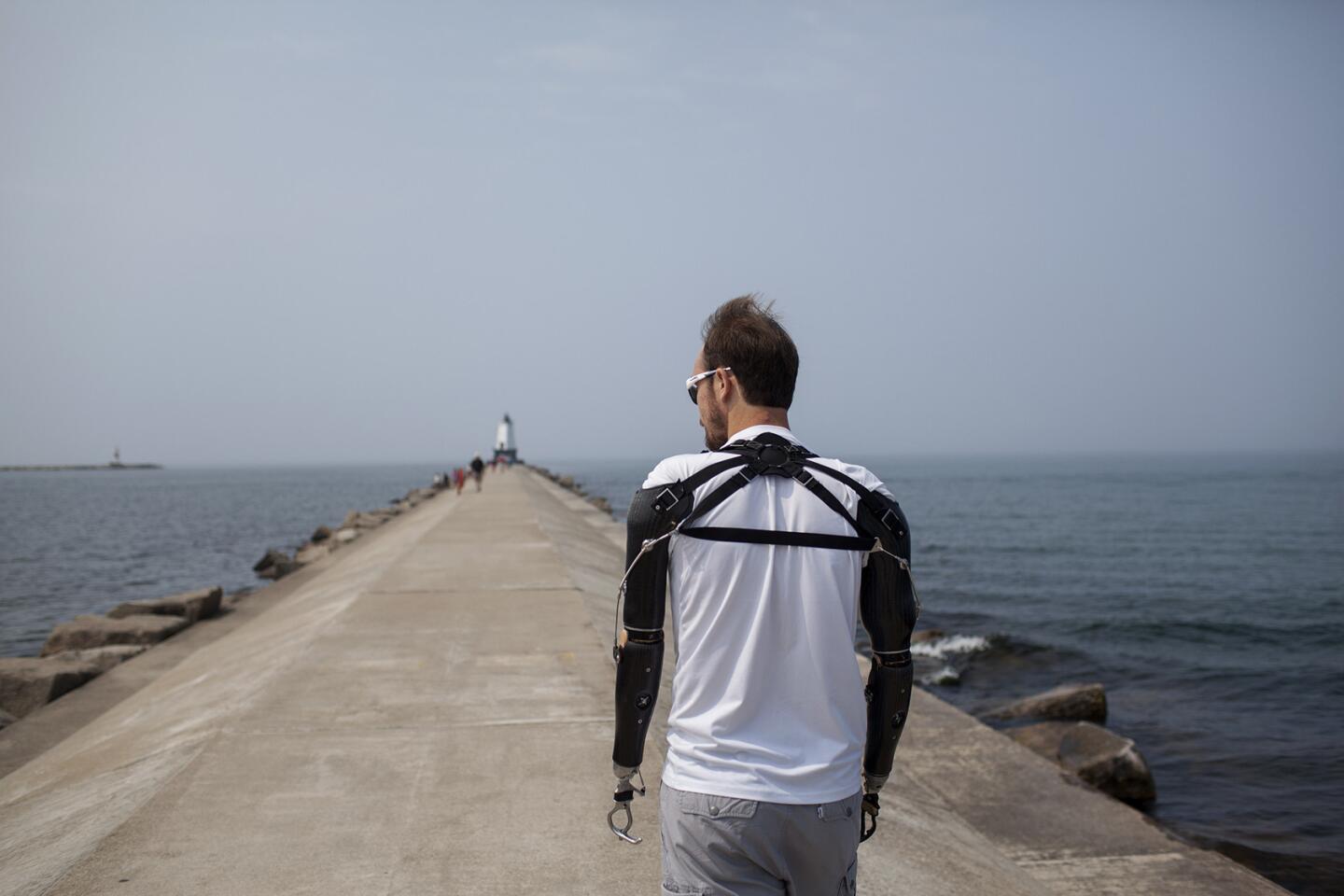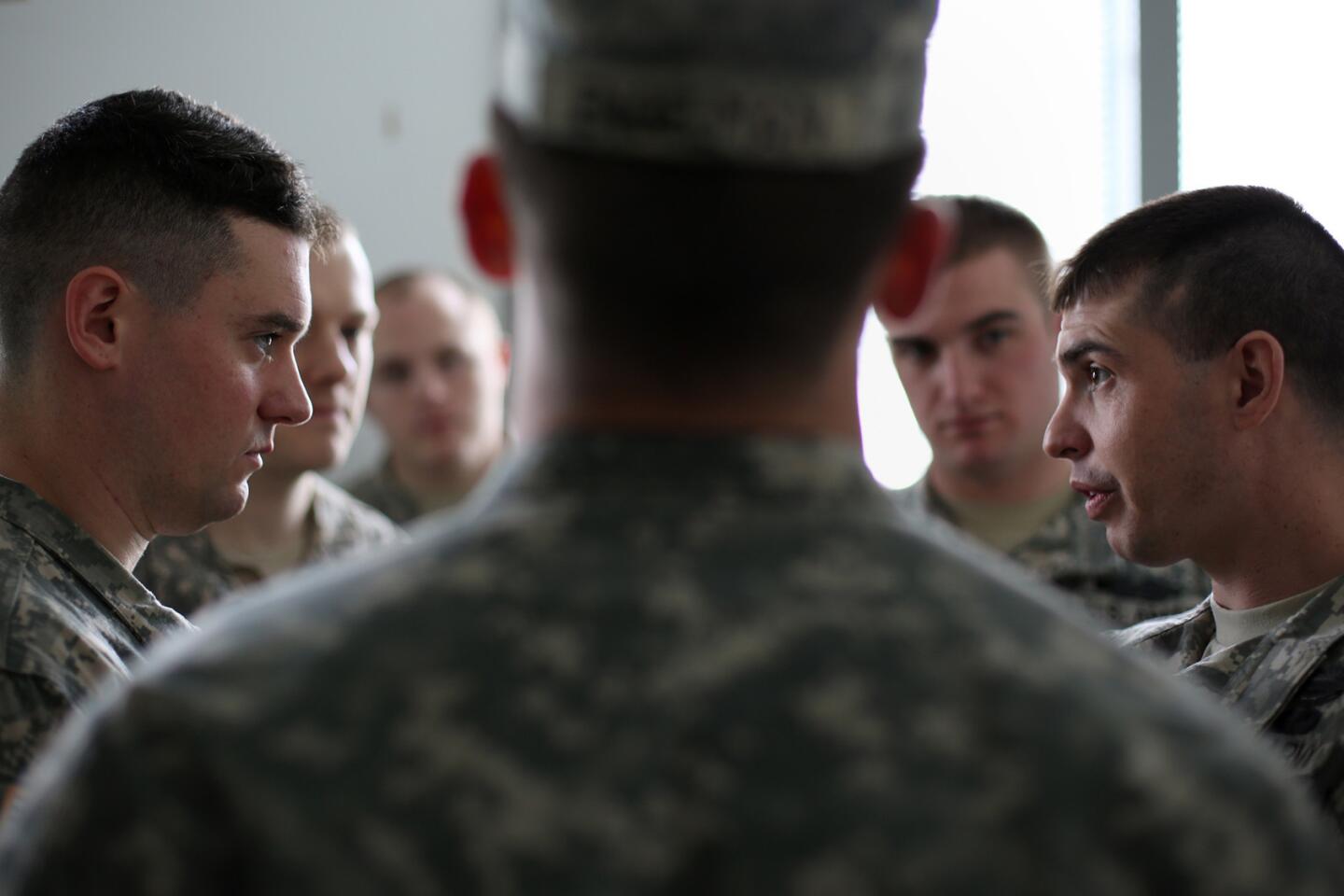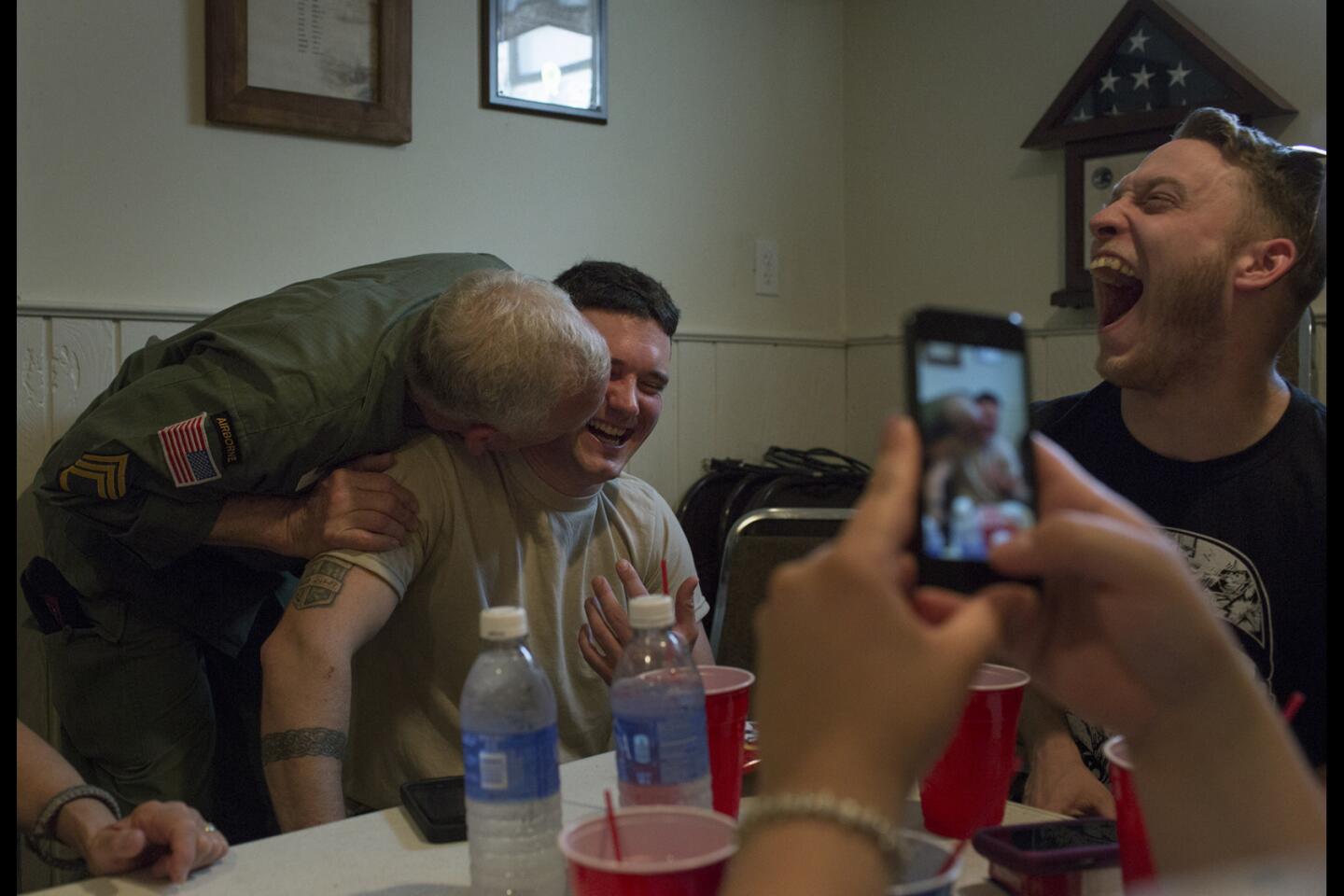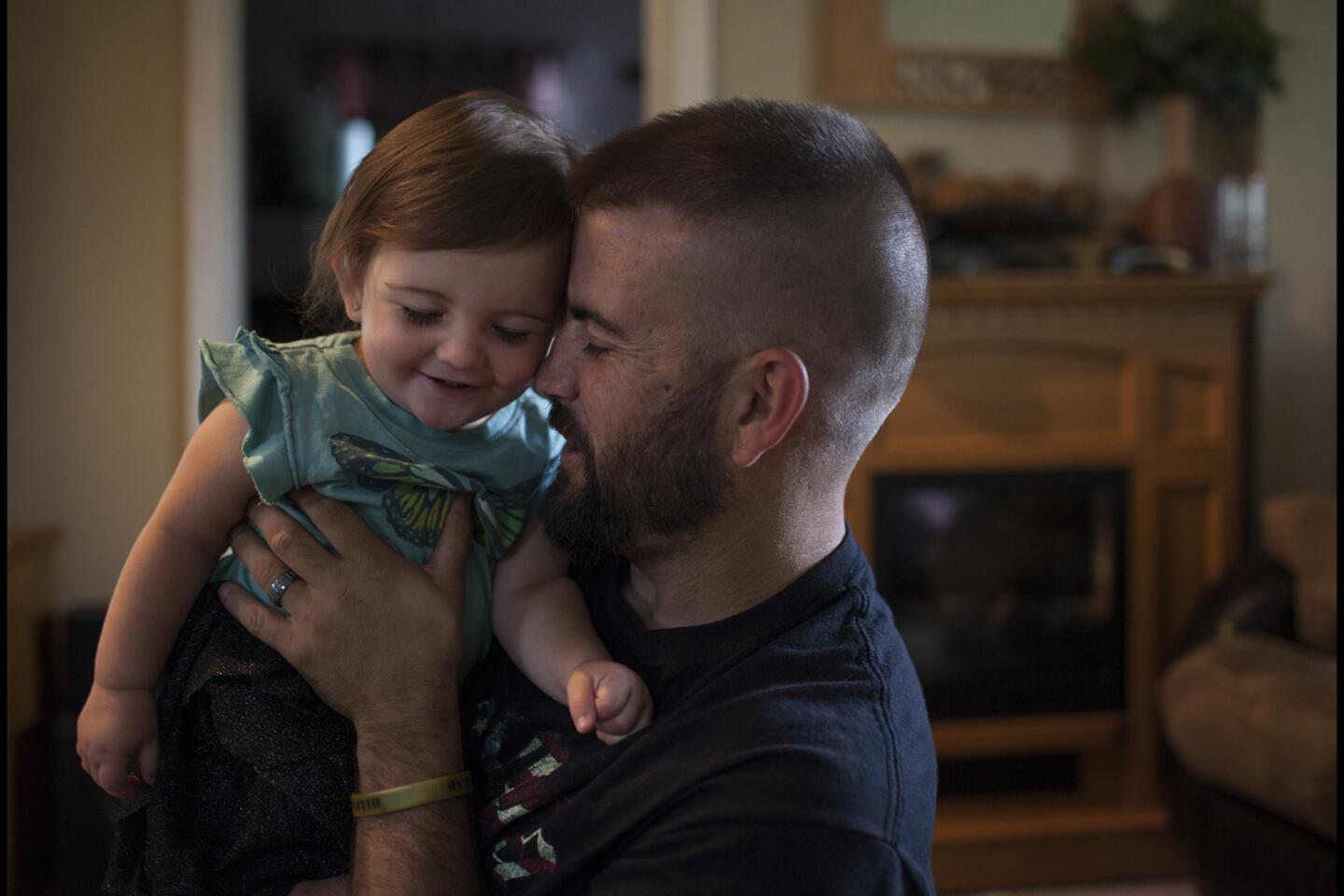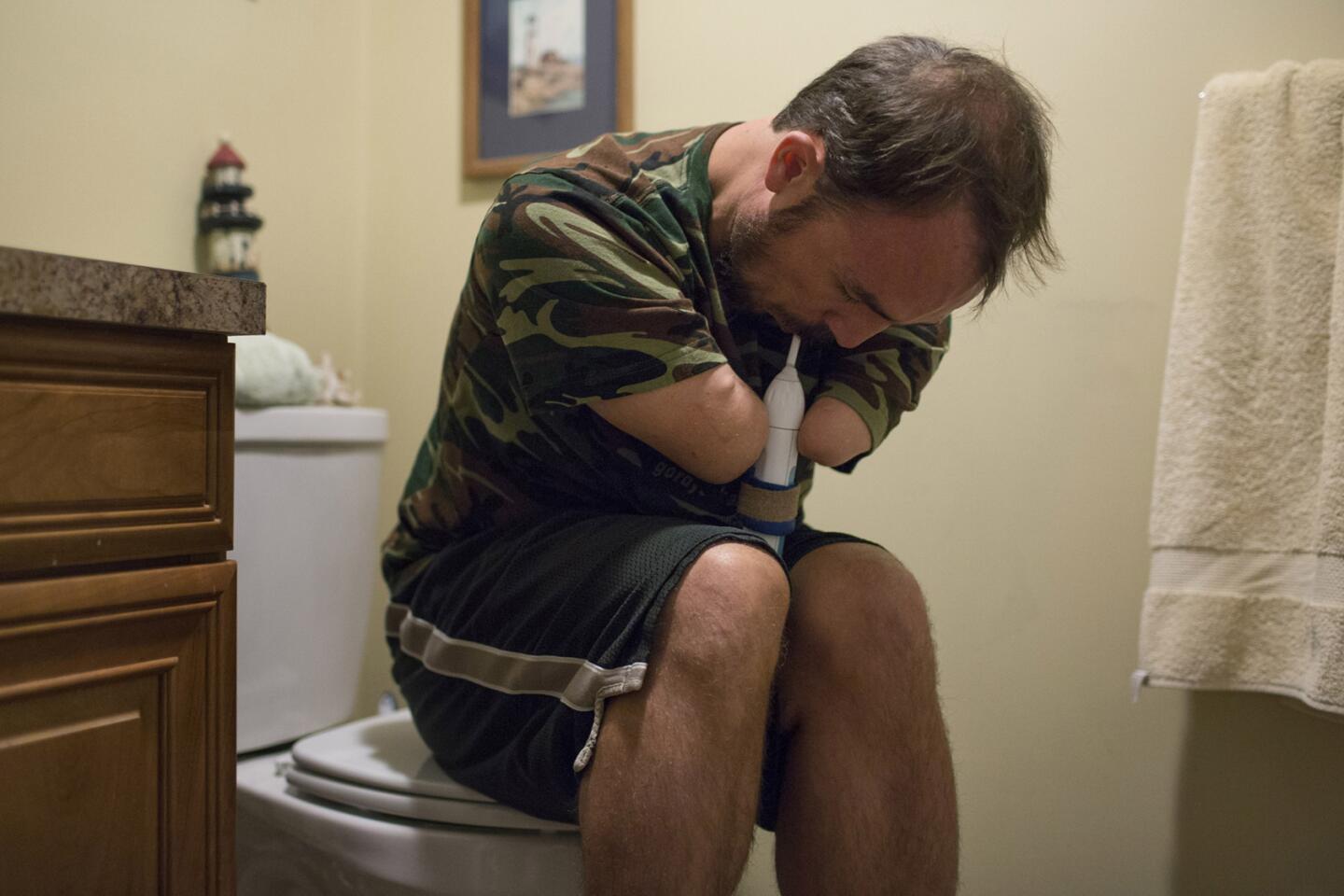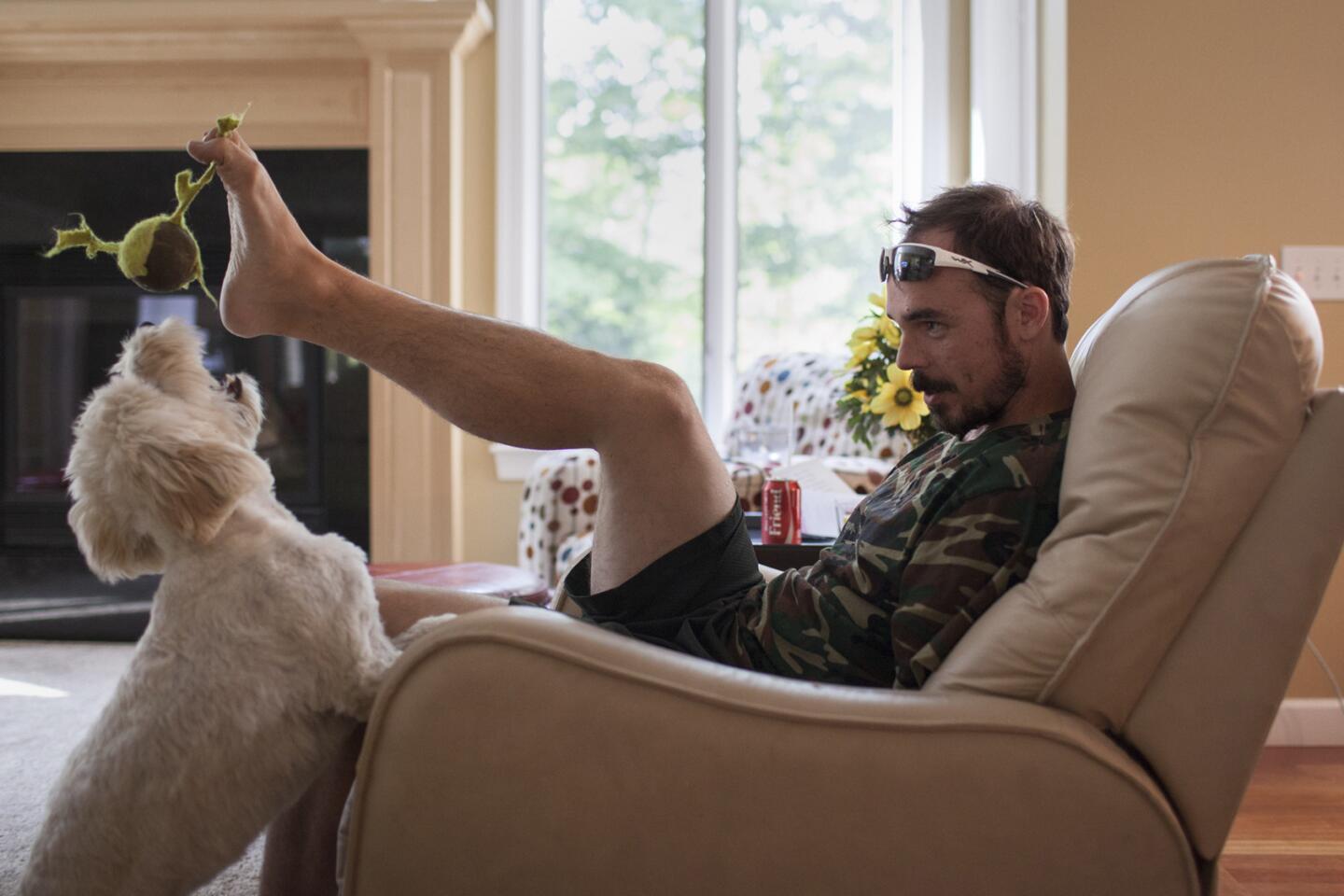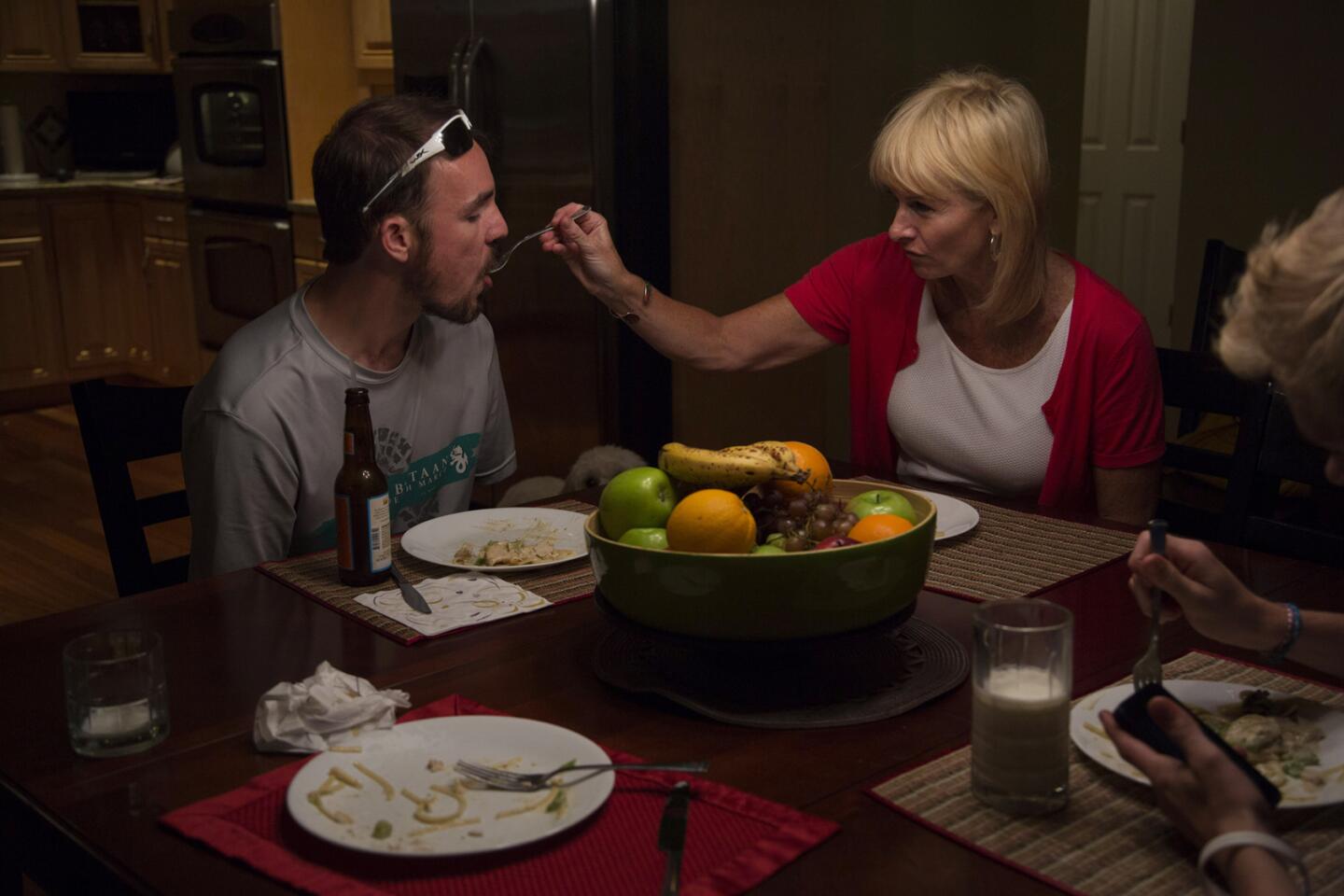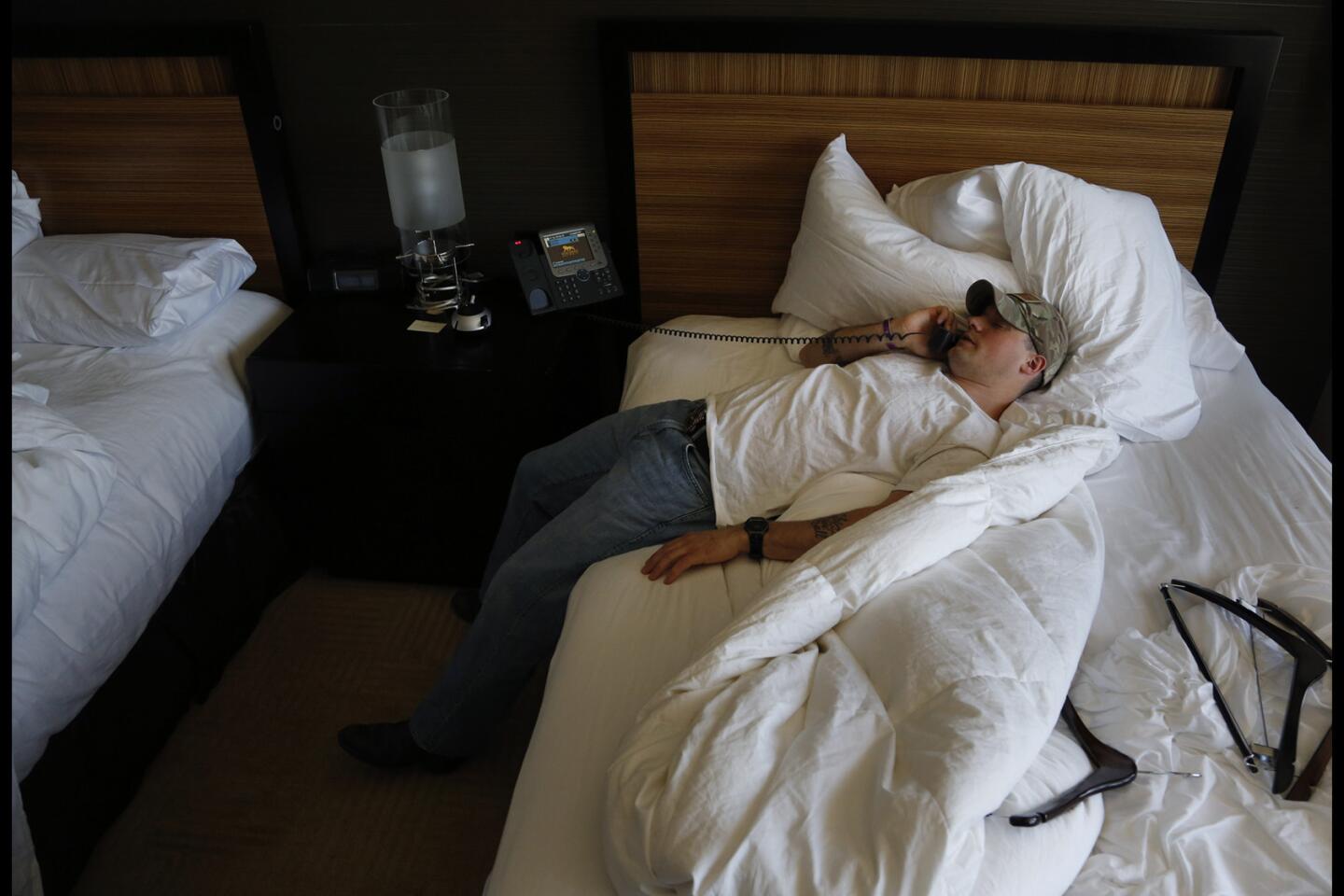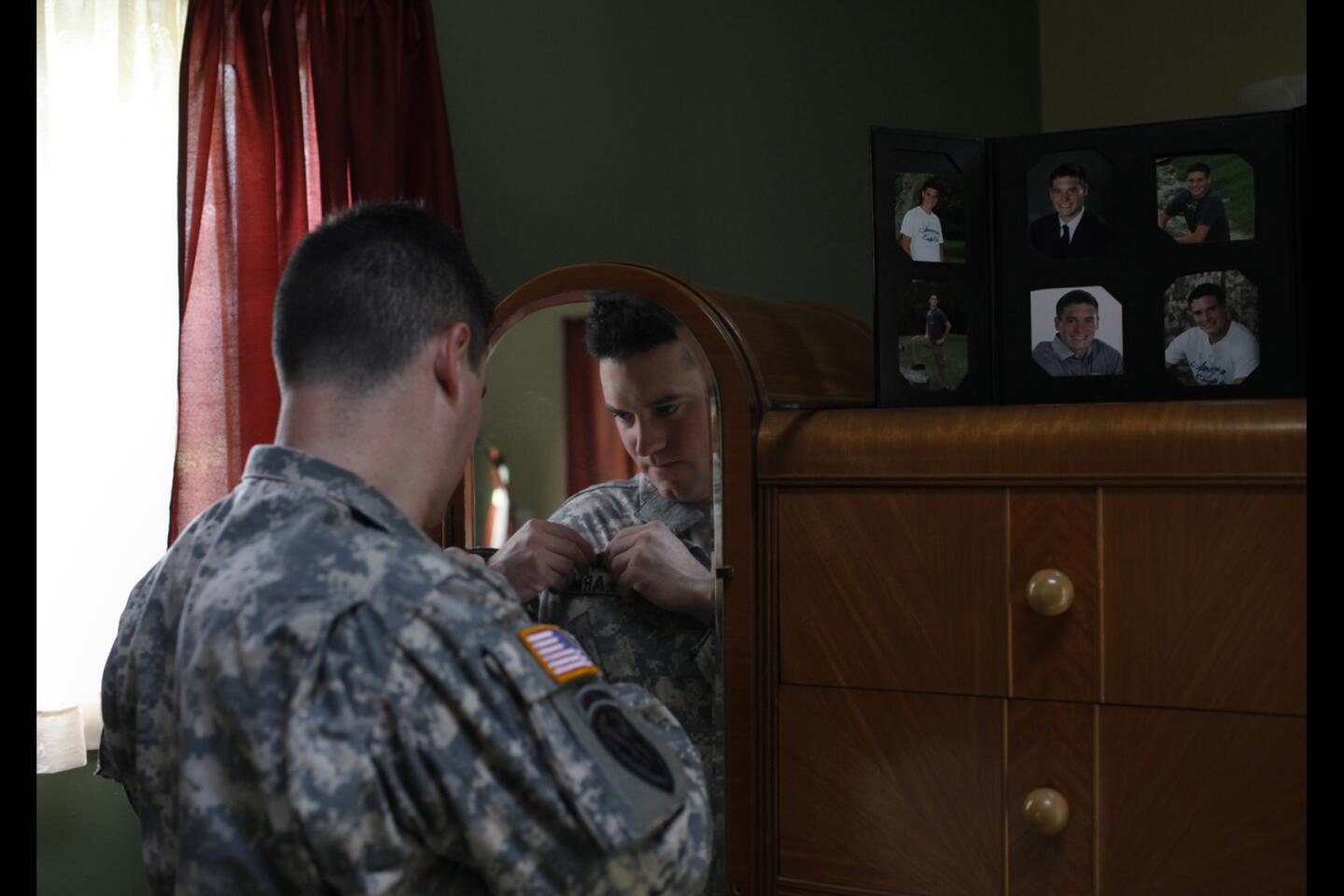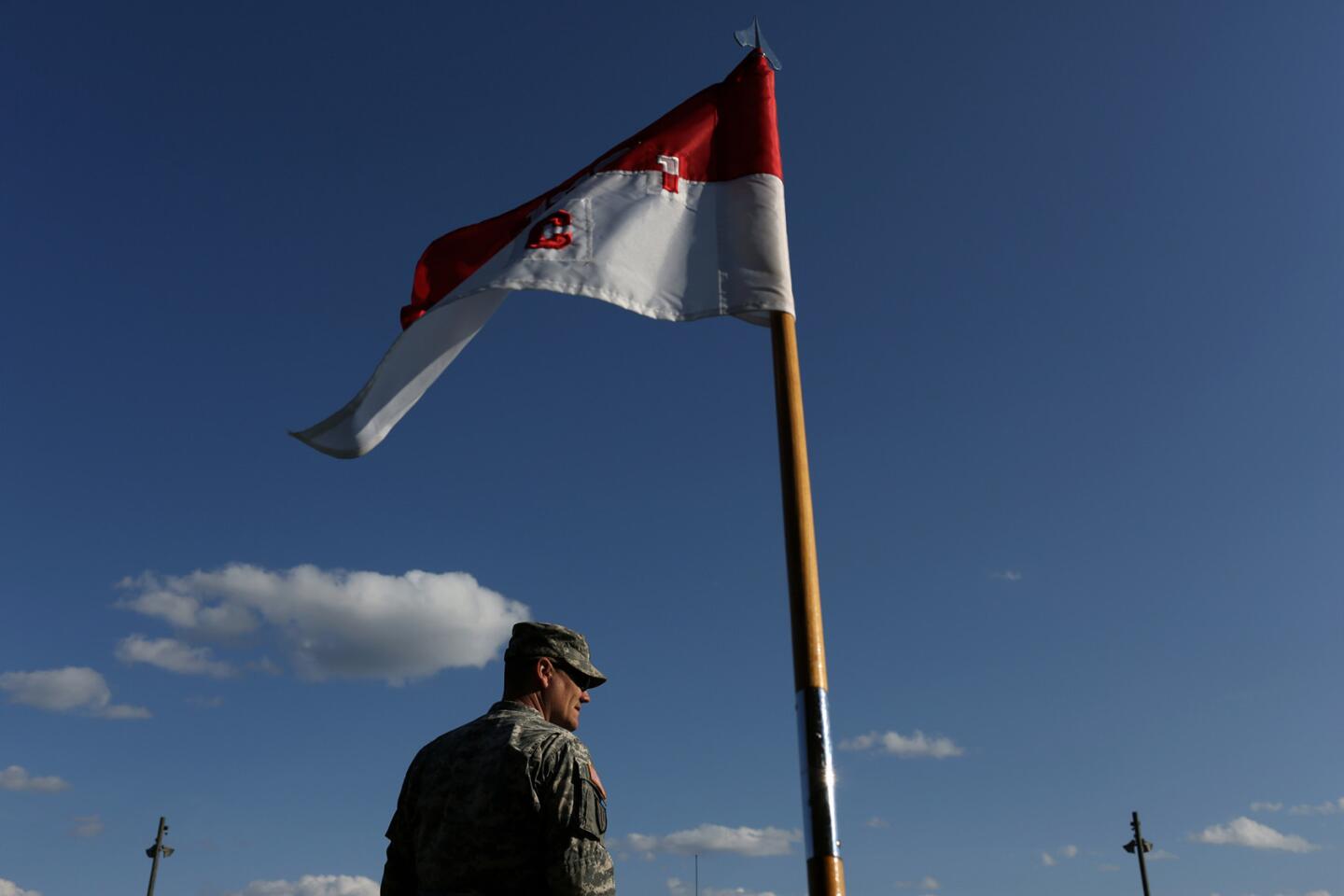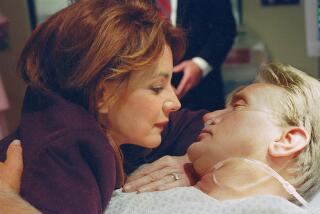Special Report: National Guard Charlie Troop back from Afghanistan but still at war
- Share via
Reporting from LUDINGTON, Mich. — The soldiers moved single file through this lakeside town, hiding in doorways and ducking down side streets as if they were still in Afghanistan.
It was July 4, 2013, and a dozen soldiers — members of a Michigan National Guard unit called Charlie Troop recently back from a nine-month combat tour — had driven in from around the state for the annual Independence Day parade.
At first, all went well.
Eric Lund, a 32-year-old former Army sergeant who had lost both arms to a roadside bomb, was the honorary grand marshal, riding in a yellow Mustang convertible. His Charlie Troop buddies marched behind, as hundreds of flag-waving citizens cheered those who went to war while they stayed home.
At an outdoor bar afterward, “all of the civilians were buying us tons of beers,” recalled Jason White, a 34-year-old infantryman who also had come home wounded. “They were feeding drinks to Lund.”
Unable to grasp a glass with his prosthetic arms, Lund sipped his beers through a straw, hour after hour. At 2:30 a.m., when a high school friend told him to go home, Lund started swinging his steel hooks in a drunken rage. Police arrested him a few blocks from the bar.
The remaining soldiers set off on foot toward the police station, joking that they would bust Lund out of jail. They moved down Ludington Avenue, the main street, in combat formation, “like a wolf pack” ready to fight, recalled White’s wife, Danielle.
“They were saying, ‘Just wait until a civilian comes up and we’ll kick his ass,’” she said.
Charlie Troop was home, but it was still at war.
As National Guard troops, the Michigan soldiers embody a myth rooted deeply in American history: that its wars should be fought by citizen-soldiers who return to their old lives, jobs and families once the fighting is over.
America’s all-volunteer Army, now 1.3 million strong, is just the opposite. It is a professional fighting force whose soldiers will likely spend many years of their young adult lives in combat zones overseas, returning to equally regimented lives at home on military bases cloistered away from civilian communities.
The National Guard was supposed to be different. For decades, Guard units were chiefly mobilized to respond to natural disasters and other emergencies in their states. Guardsmen were “weekend warriors,” training only a few days a month. Relatively few fought in Korea, Vietnam or the first Gulf War.
That changed after Sept. 11, 2001. The Pentagon sent Guard units from every state and territory to help fight in Iraq and Afghanistan. Every Guard combat brigade was deployed. More than a third deployed multiple times. More than 700 members were killed in action.
No longer citizen soldiers, they were warriors. Charlie Troop came home to high school classmates who had gone to college, gotten married, had children, bought houses. Charlie Troop had taken on the Taliban.
“I’ve got a lot of guys that are struggling,” said 1st Sgt. Mike Henry, Charlie Troop’s 47-year-old senior noncommissioned officer. “They are 25 or 30, and they don’t have jobs or skills or families. They are saying, ‘What do I do?’ A lot of them don’t know.”
One quit a Ford assembly line job to rejoin the Army full time. Another, a special-education teacher, no longer had the patience for his students’ problems. One started a lawn-care business, and one moved to Los Angeles. Several divorced. Three are still recovering from combat wounds. Car crashes left one dead and another in a coma.
The only time they feel truly at ease, many of them say, is when they are back together. It is then that they remember May 20, 2012.
::
There were five Charlie Troop soldiers, from towns across Michigan, in the first vehicle hit that day.
At the wheel was Spc. Patrick Tackett, an Iraq war veteran. Sgt. David Jackson, a father of two, manned the radio. In the rear were Spc. White, tattooed and beefy, and Sgt. Brock Howland, a boyish-looking medic everyone called Doc.
Lund, the machine-gunner, stood between White and Howland, his head and arms poking through the roof behind a rotating turret of thick steel.
It was a searing morning in the Arghandab Valley, a remote insurgent stronghold in southern Afghanistan where the desert gives way to a braided river flowing south to the city of Kandahar.
The patrol — three U.S. armored vehicles and two Afghan army pickups — was heading down a sandy track that curved around low, boulder-strewn hills. They were going to an abandoned village reportedly being used by insurgents.
As the convoy rounded a turn, a buried bomb went off beneath the second vehicle, flipping the 14-ton truck in a cloud of smoke, sand and flames.
The truck came down in a violent crash, with the wheels up and the soldiers unconscious, hanging upside down in their safety harnesses.
Back at Charlie Troop’s operating base, Henry, the senior sergeant, heard of the attack on the radio and quickly organized a rescue convoy.
In the overturned vehicle, Jackson was the first to revive and untangle himself, yelling to the others to see who was injured.
When White came to, he was enveloped in smoke and covered in blood. Every move sent sharp pains through his fractured back. The blast had blown off his helmet and slammed his head into the steel bulkhead.
Tackett crawled through the blown-out steel door and pulled White out as gunshots from insurgents hiding nearby whipped past them.
Jackson yelled at the others to fire back. White was fumbling with his jammed M-4 rifle in a groggy haze when Spc. Ryan Bartok, who had been riding in another vehicle, ran up and unjammed it. They started shooting wildly into the hills.
“This is how it ends for me,” Tackett remembers thinking as bullets flew around him. “I don’t think I’m going to make it through this day.”
On the other side of the truck, Howland, the medic, had climbed out and was digging furiously in the sand, ignoring the gunfire and his own head and back injuries. “I could hear a gurgling from under the truck,” he recalled.
Lund was underneath. The overturned turret had crushed his arms, severing his right and mangling his left below the elbow. His face was sliced open and one leg was badly fractured.
As Howland cut a tangle of wires and belts to reach him, Lund began to scream.
“You’re going to be OK. You’re going to be OK,” Howland kept repeating.
Spc. Nick Novack, who had sprinted over from another vehicle, saw Howland on his knees, his eyes wide with fear. It was Howland’s first combat casualty.
“He was looking at me and saying, ‘What do I do?’” Novack recalled.
By the time a medevac helicopter landed 20 minutes later, Howland and an Afghan medic had stopped Lund from bleeding to death. They loaded the casualties on board. After the chopper flew away, Howland bent over and threw up.
::
Danielle White was getting ready to drive to a beach on Lake Michigan when her phone rang.
“Hey Danielle.” It was Tackett, her husband’s best friend in Charlie Troop, calling from Afghanistan. “I need to tell you something …”
The line went dead.
She ran to the backyard of their one-story house in Grand Rapids, hoping for a stronger cell signal, and paced until he called back.
“I gotta talk fast. Our truck got hit today,” he said. “White’s OK but he got pretty banged up. He’s got all his limbs, though. He wanted me to call.”
“Why can’t he call?” she asked.
“That’s all I can tell you,” Tackett said, quickly hanging up.
In past conflicts, a family would learn if a loved one was injured or killed from a military official. Now wives, girlfriends and parents began hearing fragmentary reports of Charlie Troop casualties over cellphones, Facebook posts and Skype.
The news was bad. Shortly after the first blast, a second convoy had struck a buried bomb a mile down the road, wounding five more soldiers. Those who could still fight pursued their attackers into the hills, driving them off.
Seven U.S. casualties were flown to the Army combat hospital near Kandahar. Lund was in emergency surgery, while the others were treated mostly for head trauma and broken bones.
The nurses told them they could call home. But Jason White, who had a fractured vertebrae, was in too much pain. He had instructed Tackett to call Danielle, thinking it would ease her worries.
But not hearing her husband’s voice had only made her worry more. “It was pure panic at first,” she recalled.
Since no American was killed, neither the Pentagon nor the U.S. command in Afghanistan made any public statement about the battle, one of the 13-year conflict’s highest one-day casualty tolls involving a National Guard unit.
Most Americans never heard about the ambush. Charlie Troop and its extended family were left largely to themselves to recover.
When a casualty officer called Danielle from Dover Air Force Base three days later, the only information he had was that her husband had injured his back.
At 3 a.m. two days later, as she lay awake, a short message from Jason arrived on her Facebook page.
“Hey, how’s it going?”
He and Lund had been moved to another hospital at Bagram Airfield, outside Kabul, Afghanistan’s capital. As they messaged back and forth, White shared good news.
“I’m coming home.”
::
Chris Henry, the senior sergeant’s wife, remembers exactly when she stopped thinking of herself as a civilian.
It was a midsummer afternoon, three months after the ambush, and she was at home in the one-stoplight town of Paw Paw, waiting for Mike to make his daily check-in call from Afghanistan.
Mike hadn’t been injured in the attack. But she had done all she could do to help other wives, girlfriends and parents.
She was perfect for it. She had endured a tough pregnancy before giving birth to twin boys and had survived melanoma and thyroid cancer, experiences that had made her even more caring about other families in pain.
She had never thought of herself as an Army wife. She had always figured the Army was his hobby, not hers.
Mike had joined the active-duty Army after high school, but shifted to the National Guard in 1988 and stayed in after they married in 1996. He trained one weekend a month and for two weeks in August.
Otherwise, he was a parole officer and she worked in a shelter for runaway teens. The $652 National Guard paycheck helped every month, and she knew Mike liked being a part-time soldier.
Mike had gone to Iraq in 2008. Then he went back in 2010. She had coped by telling herself his absence was temporary.
But he had been home only a few months when Charlie Troop got orders to go to Afghanistan in January 2012.
Mike had served enough years in the Guard to stay in a stateside job. But Chris told him to go. She knew he couldn’t stay home while his men were risking their lives at war.
She had one demand: He had to call or email her every day. She had barely heard from him in Iraq and didn’t want to go through another deployment feeling alone.
But she still did. The words she typed that day were her way of accepting what her life had become. They weren’t for anyone else. Just for herself:
“I wake up at 3 a.m. and check my emails to see if there’s one from my husband.”
“I don’t flinch when my husband abruptly ends a phone call due to the sound of artillery. My response is nonchalant and swift: ‘OK. Call me when you can. Be careful. I love you.’”
“I am an Army wife.”
::
It was a little before 6 p.m., and in Room 1633 of a Detroit hotel, Ryan Bartok was prepping for a night mission.
Bartok wasn’t hurt in the 2012 ambush. Now, two years later, he put on his uniform — a white shirt, black suit, black tie and black shoes — and headed to the hotel’s penthouse suite.
He had a temporary job on a two-man “personal security team,” assigned to guard a visiting VIP until dawn. Standing at his post in a deserted hallway for 12 hours, Bartok said, was like being a soldier again because there at least was the possibility of danger.
But nothing happened.
“I’m the most miserable I’ve ever been,” he said. “The fight’s over and I’m not ready for the fight to be over.”
Bartok had never held a steady civilian job and didn’t want one. He lived at his parents’ house an hour away. He was not interested in college or starting a family. He relaxed by drinking, often heavily.
He desperately wanted to leave the National Guard and join the active-duty Army. But the military was shedding tens of thousands of troops, and the Army rejected his applications.
He was still training one weekend a month with Charlie Troop. He still hoped for another chance to go to war.
::
White sat at home in Grand Rapids, carefully coloring a kaleidoscope design with red, green and blue pens. He was unbothered by a screaming baby and his two barking dogs.
His therapist had suggested he try coloring these circular patterns, known as mandalas. Other than taking drugs and binge drinking, it was the one activity that helped ease his anxiety, anger and lethargy.
It was July 2014, and a week earlier he had quit his job at a produce-processing plant. The owner had hired White after learning he had been wounded in Afghanistan, and let him set his own hours. But White had found driving loaders stacked with fruit and vegetables too stressful.
White cried when he quit. “I wanted to keep up, but it was pretty overwhelming,” he said.
His attempts to restart life since the ambush have been full of disappointments.
He spent the first four months at Walter Reed National Military Medical Center in Bethesda, Md., recovering from his back and head injuries. Danielle quit her job as a therapist back in Michigan and moved in to help him.
When they returned home, Danielle was pregnant and White enrolled in a local community college. But small annoyances would trigger fierce anger. He couldn’t sleep without pills, and in the morning didn’t have energy. He soon dropped out.
He sought help at the local Veterans Affairs hospital and was prescribed sleeping pills, stimulants and anti-anxiety medication, along with painkillers for his back. But navigating the VA bureaucracy and sitting through counseling sessions proved too much for him.
He started disappearing for days at a time, drinking heavily and using marijuana and cocaine. Sometimes, after getting drunk at a downtown bar, he would walk the five miles home, taking a route through the city’s toughest neighborhoods.
He walked with his fists clenched or with a knife in one hand, hoping to get into a fight to release his anger. It was, he said, his own way of recreating the heightened sense of danger and the coiled intensity of combat — sensations he desperately missed.
When they took a vacation cruise from Miami in January 2014, Danielle learned from a friend aboard the ship that her husband was smoking crack cocaine, and had been for months.
“I just completely lost it,” she recalled.
Back in Miami, she put their baby in the car and headed home to Michigan, leaving White behind. He called an Army friend and they headed to Ft. Knox, Ky., an Army base with a hospital that specializes in treating soldiers with combat injuries.
It didn’t help. After a night of drinking, he posted a Facebook message that indicated he might be considering suicide.
Danielle, who was still driving home from Florida, saw the post and called White’s Army buddy, who tracked him down in Louisville, about 40 miles from Ft. Knox. He was put on suicide watch at a private hospital that the base uses, and put in a drug rehabilitation program the next day.
By the time he returned home to Grand Rapids, he had given up illegal drugs and drinking. But the urge had not disappeared.
The Pentagon ruled that White was 60% disabled from his back and head injuries, which would bring them a $1,544 monthly disability check. They appealed, arguing that his injuries left him 100% disabled.
He started taking 30 pills a day to control his moods, carefully doled out by Danielle from a locked box. They made plans to sell their house and move to a rural area of northern Michigan, away from the stress of the city.
He didn’t miss the rules and discipline of the military. But he would return to the fight if he could.
“When you get that rush overseas — carrying a gun and getting in a firefight — there’s nothing that compares to it,” White said.
::
Eric Lund was finally home.
He and Nick Novack, who had watched Doc Howland save Lund’s life, were sitting at an outdoor table in Ludington. A rock band was playing, children were laughing, and families were picnicking on the grass. Lake Michigan shimmered in the distance.
It was July 4, 2014, two years since the ambush and a year since Lund was arrested a few blocks away — but his hometown still wanted to help its local hero. They turned out by the hundreds at a waterfront park for a two-day music festival that was raising money to build him a home.
Earlier that morning, Lund had been guest of honor at a groundbreaking ceremony at the wooded lot a few miles away, where the house, specially designed for his needs, would be constructed free by a local builder.
Now, at the park a few hours later, Lund’s parents, other relatives and friends were selling burgers and hot dogs in a tent they dubbed the “Chow Hall” to make money for the project.
“We’re helping Eric Lund, who’s from here,” a local deejay announced on a loudspeaker. “Let’s hear it for all the veterans. Thank you for your service!”
The crowd cheered, but Lund and Novack were oblivious.
They sat face-to-face, talking intently in a roped-off enclosure where beers were for sale. Other people were milling around, but the two soldiers were in their own zone. Sweat soaked the brim of Lund’s floppy hat and ran down his wispy beard.
“No one can understand what they went through except other soldiers,” said Novack’s mother, Rhonda, who was serving burgers in the tent nearby. She had urged her son to come see Lund, thinking it might be a “healing experience” for them.
Novack wasn’t injured in the ambush, and he stayed in Afghanistan when most of Charlie Troop came home in late 2012. But other combat took a toll, and after he returned to Michigan a few months later, he was diagnosed with post-traumatic stress disorder and traumatic brain injuries.
He was taking a dozen pills a day “just to function,” he said. The Army had ruled that his problems made it impossible for him to remain a soldier.
Novack finished his beer and walked a few feet away from Lund to tell a reporter something he didn’t want his buddy to hear: He would go back to Afghanistan if he could.
“I want to live there,” he said. “I want to die there.”
Lund was sharing an apartment with a cousin in San Antonio, near the Army hospital where he’d endured dozens of surgeries and a painful rehabilitation. He had come home to Ludington for the festivities in his honor. But being on display was hard for him.
He had always worried about fitting in, his mother said, and had become more self-conscious since he was wounded, embarrassed by the difficulty he had feeding and taking care of himself.
He worried about being seen as a cripple or a charity case.
“I don’t want to be that guy,” he told his father, Dan Lund, after seeing an elderly man in a wheelchair crossing the street.
He felt less of an oddity in San Antonio, where soldiers without limbs are common, and there is a network of organizations to assist those recovering from wounds from Iraq and Afghanistan.
Soon White arrived at the picnic, with Danielle and their young baby. They had driven 100 miles up from Grand Rapids, despite Danielle’s worries it would turn into a drunken spree like the Fourth of July parade the year before.
White and Lund were not close friends, but White couldn’t stand the thought that Lund would be forgotten by Charlie Troop. So he was here, watched closely by Danielle to make sure he didn’t drink.
Every few minutes Lund leaned over and sipped from a straw in his beer can. When the heat became unbearable, he unhooked his prostheses and laid them on the ground. A few passersby stared.
Other members of Charlie Troop were expected later. They were planning a party that evening at a cabin in the woods, away from the civilians.
::
On May 20, 2015, the three-year-anniversary of the ambush in Afghanistan, the soldiers of Charlie Troop called and texted each other all day, as they do every year. Many members of the unit have moved on, as best they can. Some have not.
White was arrested this spring on vacation in Florida, charged with battery and destruction of property at a motel. The charges were later dropped. He resumed using illegal drugs and is now in a long-term treatment program.
Bartok took a security guard job with a defense contractor in Afghanistan, returning to the life of danger he craved. Novack’s pickup went off the road one night outside Kalamazoo and hit a tree. After months in a coma, he died in February.
Lund moved this month to the house built by his Ludington neighbors. He is awaiting arm transplant surgery.
Twitter: @davidcloudlat
This is one of several reports on the growing separation between America’s all-volunteer military and the public it serves. Read more.
More to Read
Sign up for Essential California
The most important California stories and recommendations in your inbox every morning.
You may occasionally receive promotional content from the Los Angeles Times.
